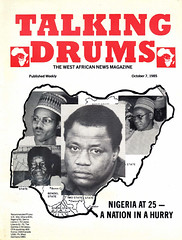Babangida declares economic emergency
In a radio and TV broadcast President Ibrahim Babangida declared a 15-month state of economic emergency which would involve among many things the banning of imports of rice and maize and the cancellation of counter trade deals under which Nigerian goods have been exchanged for consumer goods and foodstuffs from other countries.
The President said the emergency period would require 'strong belt- tightening' but promised that the burden would be spread as equitably as possible. Spelling out the fundamental objectives of his administration, President Babangida listed economic reconstruction, social justice and self- reliance. He said primacy would be given to rural development through agricultural industrialisation complemented by the exploitation of domestic non-agricultural resources. Also there would be a shift in emphasis from large scale to small scale farming and from large irrigation projects to small earth dams. Through this the government hopes to expand produc- tion of staple foods like rice as well as vegetable oil and animal products. President Babangida further announced a scheme to allow Nigerian banks to operate foreign currency so as to attract foreign investment and generate foreign exchange.
He also promised to overhaul the system for granting import licences to reduce "bottlenecks and ensure the importation of clearly scarce com- modities." Hence import licences not involving the approval of foreign ex- change will now be restricted to 'critical' items such as books, school and hospital equipment, drugs, agriculture and road construction machinery.
On the question of debts President Babangida warned the creditors' of the country's $20 billion foreign debts and $39.4 million domestic debt: "I must make it abundantly clear that the government will only admit those external and internal debts which have been duly documented and ascertained."
The President also promised to clamp down on new debts and to order a review of private and public loan- assisted schemes.
There was no commitment in the President's speech on whether his government had decided to resume negotiations with the IMF for the $2.5 billion stand-by loan but he praised the enthusiasm in the current debate on the loan.
Warning that the austere times will stay, he said, "with or without the loan all of us must make hard choices in- volving great difficulties and requiring sacrifices from everyone and every sector including the armed forces."
Emphasis, he added, would shift from the nation's "buying and selling syndrome and parasitic services to the more enduring domain of increased total real production, raising labour productivity and greater efficiency of investment."
After stating that the war against in- discipline would continue the Nigerian Head of State also dealt with the ques- tion of political detainees and promised that a judicial tribunal would be established to review all cases involving released detainees, those convicted by military tribunals and those still in detention and awaiting a final judgement on their cases.
On the political front, President Babangida who took over the leadership of the country from General Buhari on August 27 failed to reveal any definite programme other than announcing that a political programme for the country would be made known during the course of 1986.
